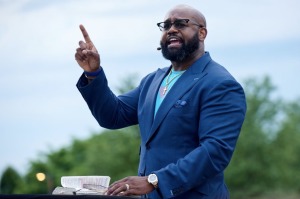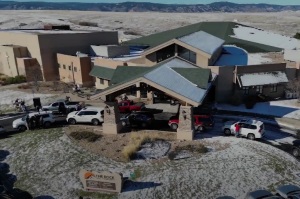Pastor lists 7 things depressed Christians can do to navigate Christmas

The holidays can be hard on those who struggle with depression.
“The thought of mixing with happy people fills you with dread. The thought of remembering lost loved ones fills you with gloom. How can people be so happy when you are so sad? How can people celebrate when you are in mourning? It jars your soul and scrapes your tender wounds, doesn’t it?” said David Murray, professor of Old Testament and practical theology at Puritan Reformed Theological Seminary and pastor of Grand Rapids Free Reformed Church in Michigan, on Crossway.org.
The pastor, who is also an author, warned that hiding away or lashing out will not help with depression, but will only make it worse. With that in mind, he proposed seven suggestions for Christians to navigate Christmas that will also help with their healing.
Murray started off with what he called the “too obvious” suggestion to pray, but said that sometimes people miss the obvious.
“Plead: ‘Lord, I am weak, I need your power, I need your patience, I need your joy.’ Promise: ‘I will rely on you alone to carry me and even use this time for my help and healing.’ It’s amazing how the gospel can turn the greatest pain into the greatest therapy,” he wrote.
Next, those struggling should share with their friends and family about their depression and ask for prayers and protection from those who don’t understand what they’re going through.
Thirdly, he urged Christians to make plans carefully over Christmas, warning that too much withdrawal from social events “will only depress you further; but so will total immersion.”
“So, plan ahead and choose wisely which social occasions you will go to and how long to spend there. Perhaps try to avoid going to too many gatherings on consecutive days or evenings. You need downtime to be quiet and to refuel,” he pointed out.
Murray then talked about the importance of having a regular routine, which he said is vital for those struggling with depression.
“Your body, mind, and soul flourish when you are following a predictable pattern of sleeping, eating, working, and relaxing. All this is threatened by the irregularity and unpredictability of the holidays,” he noted.
"You will have to accept a degree of change in this area in these weeks, yet still fight to maintain as much regularity as you can. You don’t want to waste all your good work in this area.”
The pastor also mentioned the benefits of exercise and how hard it is to be consistent in this regard over the holidays. He said that with so much sitting around and so much food, it is important to continue to be active for one’s physical, mental and spiritual health.
Those with depression should also try to preach to themselves.
“You’re going to be tempted in the next few weeks to write a chapter that dwells on the present estrangement with your daughter and how much you miss her at family occasions,” he offered as an example.
“While we can’t deny the reality of this, and we continue to pray and work toward reconciliation, can I suggest that you write another chapter in parallel with it? Write a chapter on the way God has reconciled you to his Son through his death on the cross (Eph. 2:14–18; 2 Cor. 5:18–21),” he noted.
“Fixing your mind on this greatest estrangement and reconciliation story will help you to balance a bitter experience with the sweetest experience, and will also give you hope in God’s reconciling power. It’s amazing how the gospel can turn the greatest pain into the greatest therapy.”
Finally, Murray advised believers to preach to others as well.
“The unbelievers in your family will be looking to see how you react to your recent losses and how you are responding to your depression. They will see you are sad and they will ask how you are doing. How about this for an answer: ‘Sorrowful, yet always rejoicing’ (2 Cor. 6:10). That should startle them!” he wrote.
“But it will also start some profitable conversations that give you an opportunity to testify to God’s grace to you in these days.”
Recently, Pastor J.D. Greear of The Summit Church in Raleigh-Durham, North Carolina, criticized the way some churches deal with depressed Christians.
"Sometimes, I think we can be too quick with our answers in church: Are you feeling sad? Life got you down? Well, that can't be from God! Just pop on some K-love, cause everything in the Christian life should be positive and encouraging all the time," Greear wrote on his website in October.
"But when you are experiencing depression, you don't need a quick encouragement. You need a God who walks through pain with you."
Follow Stoyan Zaimov on Facebook: CPSZaimov





























